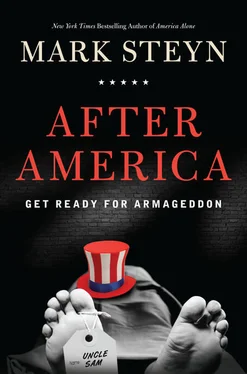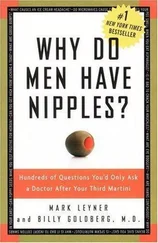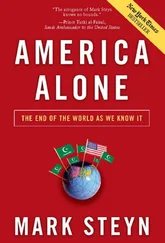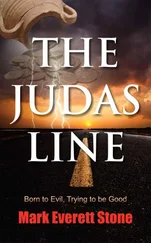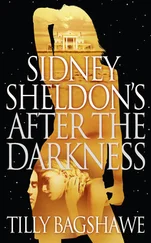Greece’s unsustainable spending is propped up by Germany, and Germany’s unsustainable spending is propped up by America. So who’s left to prop up America’s unsustainable spending? Yet Washington is pushing on to Europe’s future when even the Europeans are figuring you can’t make it add up.
As the fog of Obama’s rhetoric lifted and the scale of his debt mountain became clear, the president’s courtiers began to muse about the introduction of an EU-style “VAT.” 47Americans generally translate that as a “national sales tax,” but it actually stands for “value-added tax,” because you’re taxing the value that is added to a product in the course of its path to market. Yet what Europe needs is to add “value” in a more basic sense.
There are two main objections to the wholesale Europeanization of America. The easy one is the economic argument. But the second argument is subtler: the self-extinction of Europe is not just a matter of economics.
Advanced social democracies don’t need a value-added tax; they need a value-added life. “The Europe that protects” may protect you from the vicissitudes of fate but it also disconnects you from the primary impulses of life. Government security does not in and of itself make for a satisfying, purposeful life. Studies from the University of Michigan and elsewhere suggest quite the opposite—that welfare makes one unhappier than a modest income honestly earned and used to provide for one’s family. 48“It drains too much of the life from life,” said Charles Murray in a speech in 2009. “And that statement applies as much to the lives of janitors—even more to the lives of janitors—as it does to the lives of CEOs.” 49Capitalists sometimes carelessly give the impression that theirs is a materialistic argument. But anti-capitalists do not want for material comforts—you go to the poorest part of town and you see plenty of iPhones and plasma TVs. And Eutopia is distinguished mainly by a lethargic hedonism: shorter working hours, longer vacations, earlier retirements, bigger benefits. What do they do with all that free time? High-school soccer and 4-H at the county fair? No. As we’ve seen, kids not called Mohammed are thin on the ground. God? No.
When you worship the state-as-church, you don’t need to bother showing up to Mass anymore. Civic volunteerism? No. All but extinct on the Continent. Do they paint, write, compose? Not so’s you’d notice. Never mind Bach or even Offenbach, these days the French can’t produce a Sacha Distel or the Germans a Bert Kaempfert, the boffo Teuton bandleader who somewhat improbably managed to play a critical role in the careers of the three biggest Anglophone pop acts of the twentieth century—he wrote “Strangers in the Night” for Sinatra, “Wooden Heart” for Elvis, and produced the Beatles’ first recording session. If that sounds like a “Trivial Pursuit” answer, it’s not. Eutopia turned out to be the trivial pursuit; to produce a Bert Kaempfert figure right now would be a major cultural accomplishment Europe can’t quite muster the energy for. Life is a matter of passing the the new Athens time—or, indeed, of holding the moment: “Linger awhile, how fair thou art,” in the words of Goethe’s Faust, which would make a fine epitaph for the European Union.
“In the long run we are all dead”: Keynes’ flippancy disguises his radicalism. For most of human history, functioning societies honor the long run; it’s why millions of people have children, build houses, plant gardens, start businesses, make wills, put up beautiful churches in ordinary villages, fight and if necessary die for king and country…. It’s why extraordinary men create great works of art—or did in the Europe of old. A nation, a society, a community is a compact between past, present, and future, in which the citizens, in Tom Wolfe’s words, “conceive of themselves, however unconsciously, as part of a great biological stream”: Most people, historically, have not lived their lives as if thinking, “I have only one life to live.” Instead they have lived as if they are living their ancestors’ lives and their offspring’s lives and perhaps their neighbors’ lives as well…. The mere fact that you were only going to be here a short time and would be dead soon enough did not give you the license to try to climb out of the stream and change the natural order of things. 50
Europe climbed out of the stream. You don’t need to make material sacrifices: the state takes care of all that. You don’t need to have children. And you certainly don’t need to die for king and country. But a society that has nothing to die for has nothing to live for: it’s no longer a stream, but a stagnant pool. How fair thou hast been—but only for the moment, and the moment is passing. Europe’s economic crisis is a mere symptom of its existential crisis: What is life for? What gives it meaning? Post-Christian, post-nationalist, post-modern Europe has no answer to that question, and so it has 30-year-old students and 50-year-old retirees, and wonders why the small band of workers in between them can’t make the math add up.
Yet it’s not about the arithmetic, but about instilling in people for whom life is a diversion a sense of purpose larger than themselves: What’s it all about, Alfie? Cradle-to-grave nanny-state “protection”?
Europe is already dead—in the short run.
Linger awhile, how fair thou art. It’s nice to linger at the brasserie, have a second café au lait, and watch the world go by. At the Munich Security Conference, President Sarkozy demanded of his fellow Continentals, “Does Europe want peace, or do we want to be left in peace?” 51To pose the question is to answer it. But it only works for a generation or two, and then, as the gay bar owners are discovering in a fast Islamifying Amsterdam, reality reasserts itself.
We began this book with some thoughts from Bertie Wooster and Jonathan Swift regarding Belshazzar’s feast and “the writing on the wall.”
But sometimes there’s so much writing you can barely see the wall. On my last brief visit, Athens was a visibly decrepit dump: a town with a handful of splendid ancient ruins surrounded by a multitude of hideous graffiti-covered contemporary ruins. Sit at an elegant café in Florence, Barcelona, Lisbon, Brussels, almost any Continental city. If you’re an American tourist, what do you notice? Beautiful buildings, designer stores, modern bus and streetcar shelters… and all covered in graffiti from top to toe. The grander the city, the more profuse the desecration. Go to Rome, the imperial capital, the heart of Christendom: the entire city is daubed like a giant New York subway car from the Seventies. Look at your souvenir snaps: here’s me and the missus standing by the graffiti at the Trevi Fountain; there we are admiring the graffiti at the Coliseum.
A New York Times feature on Berlin graffiti reported it as an art event, a story about “an integral component of Berliner Strassenkultur.” 52But it’s actually a tale of civic death, of public space claimed in perpetuity by the vandals (like graffiti, another word Italy gave the world, as it were). At the sidewalk cafés, Europeans no longer notice it. But it is in a small, aesthetically painful way a surrender to barbarism—and one made even more pathetic by the cultural commentators desperate to pass it off as “art.” And it sends a signal to predators of less artistic bent: if you’re unwilling to the new Athens defend the civic space from these coarse provocations, what others will you give in to?
It’s strange and unsettling to walk through cities with so much writing on the wall, and yet whose citizens see everything but. Bertie Wooster’s Aunt Dahlia is right: once upon a time, you were certainly an ass if you didn’t know where “the writing on the wall” came from. It was part of the accumulated cultural inheritance: in the old Europe, Handel and William Walton wrote oratorios about it. Rembrandt’s painting of Belshazzar’s Feast hangs in the National Gallery in a London all but oblivious to its significance. Instead of paintings and oratorios and other great art about the writing on the wall, Europeans have walls covered in writing, and pretend that it’s art. Today, I doubt one in a thousand high-school students would have a clue whence the expression derives. And one sign that the writing’s on the wall is when society no longer knows what “the writing on the wall” means.
Читать дальше
